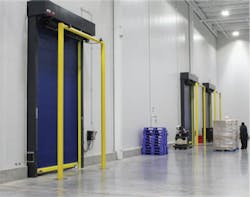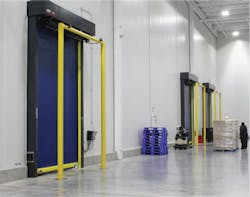How high-speed doors help control temps, cut energy waste
[javascriptSnippet]
Chances are, when you visit a McDonald’s, Starbucks, or other major restaurant chain, what you’ll find on the menu arrived there with the help of Golden State Foods (GSF), a major link in the supply chain for many globally known foodservice operations. Vital to the success of GSF’s high-volume, 24/7 operations at its newest distribution center in McCook, IL, is an oft-underappreciated facility asset: storage doors.
“We wanted to do is provide our associates with a good, reliable door,” says GSF’s Wayne Luter. High-speed, durable doors, GSF recognized, would help speed the flow of operations and, in so doing, help ensure that cold-storage foods meet quality standards and are ready to leave the distribution center on time. They also would provide energy savings: “Certainly we were also looking at a door that would help us continue to maintain a consciousness of energy conservation,” Luter says.
For its 152,670-square-foot regional headquarters and logistics center in McCook, GSF selected Rytec high-performance doors. GSF McCook’s products, which include liquid product, meat product, and produce, flow through the facility’s freezer storage space, which is equipped with six Rytec Turbo-Seal® Insulated doors and accessed in the fresh food cooler via three Rytec Turbo-Seal SR Self-Repairing doors. The high cycle operation of these doors is crucial to GSF McCook fulfilling its mission. Says Charlie Stone, director of distribution services at the facility: “We need a door that’s reliable along with a door company that is reliable, and we have found that to be the case with Rytec.”
GSF maximizes its McCook building footprint – divided between a two-story office space and the warehouse/distribution center – by taking the ceiling height to 40 feet and by setting up a cross-dock, flow-through handling pattern.
The distribution space breaks out to 54,000 square feet of dry storage. The building’s cascade refrigeration system maintains 14,040 square feet of cooler space at 34°F and 23,400 square feet of freezer storage at 10°F to handle the bulk of the QSR offerings. This all passes through the building across 28,080 square feet of cooler dock staging at 34°F.
Thanks in part to the 40-foot high ceiling enabling racks five levels high, storage capacity here is triple that of GSF's 40-year-old operation at Lemont, IL, 40 miles to the west. Masts at 15 feet high on their forklifts reach the highest shelves, and each of the high-traffic doors has 16-foot tall panels to handle this traffic.
The ceiling height at the McCook facility presents both benefits and challenges. This high-rise storage let GSF lay out shorter aisles to make its cross-dock approach more efficient in terms of product access. Nevertheless, compacting the footprint means there's less wall space for cutting doorways into the walls. As a result, the McCook facility has just three doors going into and three going out of this high-volume freezer.
GSF McCook has a considerable volume of product to handle and disperse to hundreds of locations, with each of the restaurant locations it serves ordering nearly 100 inventory items daily. Take French fries: The McCook facility moves three or four trailers of fries every day, with pallets in the freezer going out the door every three to five hours.
Based on its volume, this 24/7 operation generates 10,000 to 15,000 cycles per month. Inventory for each account cycles every six days. Turns in the cooler happen twice a day and in the freezer, inventory turns every day-and-a-half.
The combination of the compact footprint, high ceilings and high volume enables GSF to get product throughout its service territory on schedule, but here’s the challenge: With traffic streaming in and out of the building through 52 dock doors, losing a single high-traffic door would severely jeopardize deliveries.
“We cannot afford to lose an opening,” says warehouse manager Jamie Marines.
Marines points out that If one door goes down, Marines notes, the facility loses 30% of its shipping capacity. And with tight schedules and so many restaurants depending on GSF, this downtime is unacceptable.
That's why, when selecting doors, durability was a top priority. “We are hard on things,” Marines says.
In GSF's fast-moving operation, door speed is key to product flow and avoiding forklift-door collisions. For both door styles operating at a rapid speed of more than 100 inches per second, the 16-foot door panels open fully in less than two seconds. With the high number of cycles in this operation and the 24°F temperature differential between the freezer and docks, the door’s high speed significantly reduces cold air infiltration.
Fast door speed also makes panel collisions with the tall-mast forklifts almost impossible. But if a collision were to occur, the self-repairing system on both door styles would automatically reset the panel back into its guide and instantly restore door operation without human intervention.
When it comes to routine door maintenance, the Rytec doors’ System 4TM controller allows for adjustments to door operation at floor level – a significant benefit when doors are 16 feet tall. The system offers total digital control and self-diagnostics to minimize maintenance surprises. The AC drive enables soft starts and stops, while providing smooth motion at the door’s high speeds for longer component life.
Stone emphasizes that employee safety also is a major concern at the GSF McCook operation. To avoid accidental contact with the speeding Rytec door panels, the PathWatchTM LED safety light system (in amber and red) along the door columns warns employees when the door is about to close and when it is actually closing. Two thru-beam photo eyes, a dual pneumatic reversing edge and threshold warning lights protect and alert by reversing the descending door panel if an employee is in the doorway.
The McCook operation is a LEED Gold-certified distribution center, reflecting GSF's commitment to reduce carbon emissions and minimize energy use, water consumption, and waste. Marines says the high-speed doors, which have tight full-perimeter seals, help support this mission: By helping maintain temperatures in the coolest storage areas, the doors protect product quality and keep temperature fluctuations (and thus energy use) to a minimum.
In addition, the Turbo-Seal Insulated door’s thick panel reduces heat transmission. This combination helps the facility save on energy costs and reduce operating time on the refrigeration system for longer system life.

